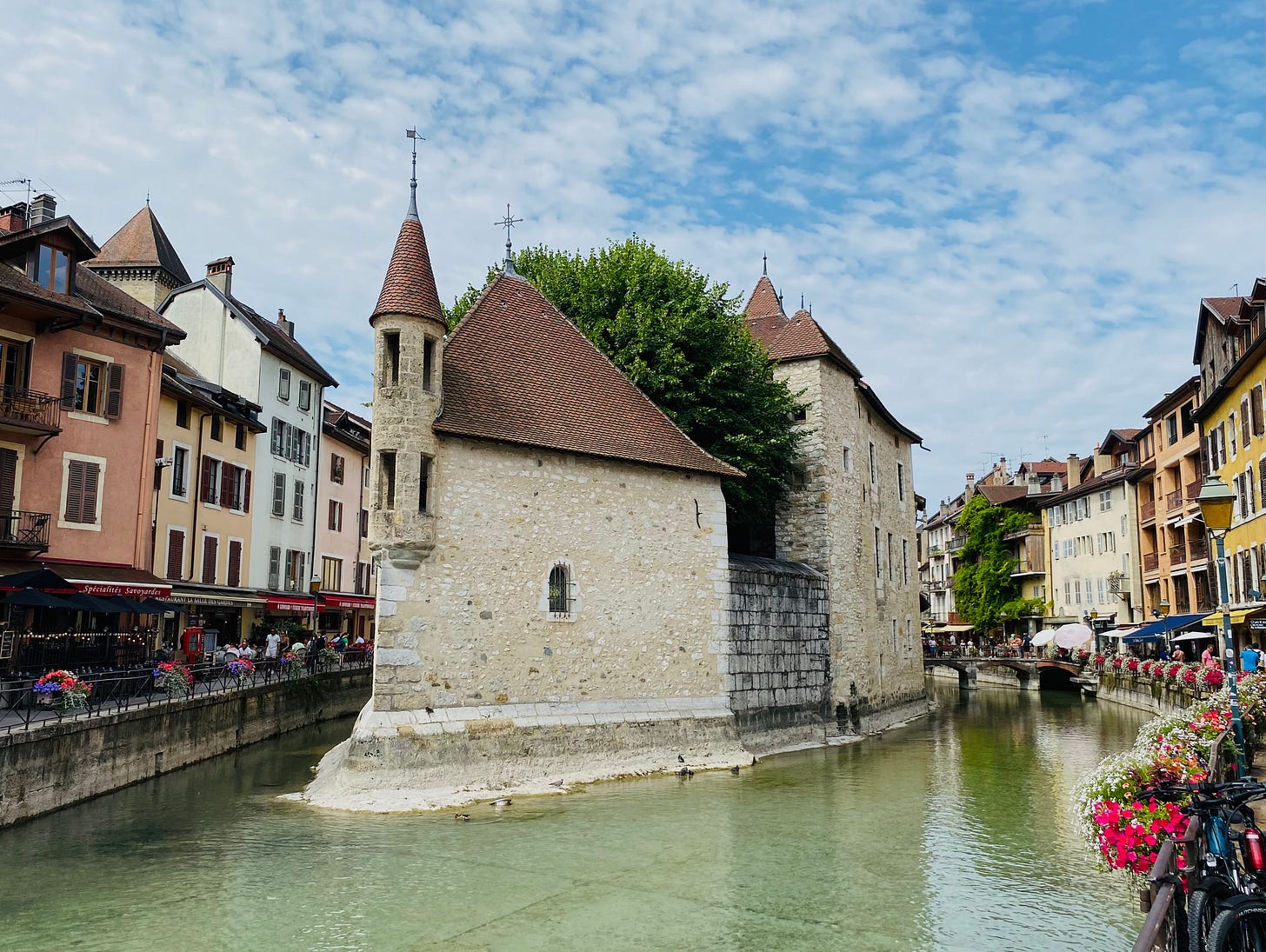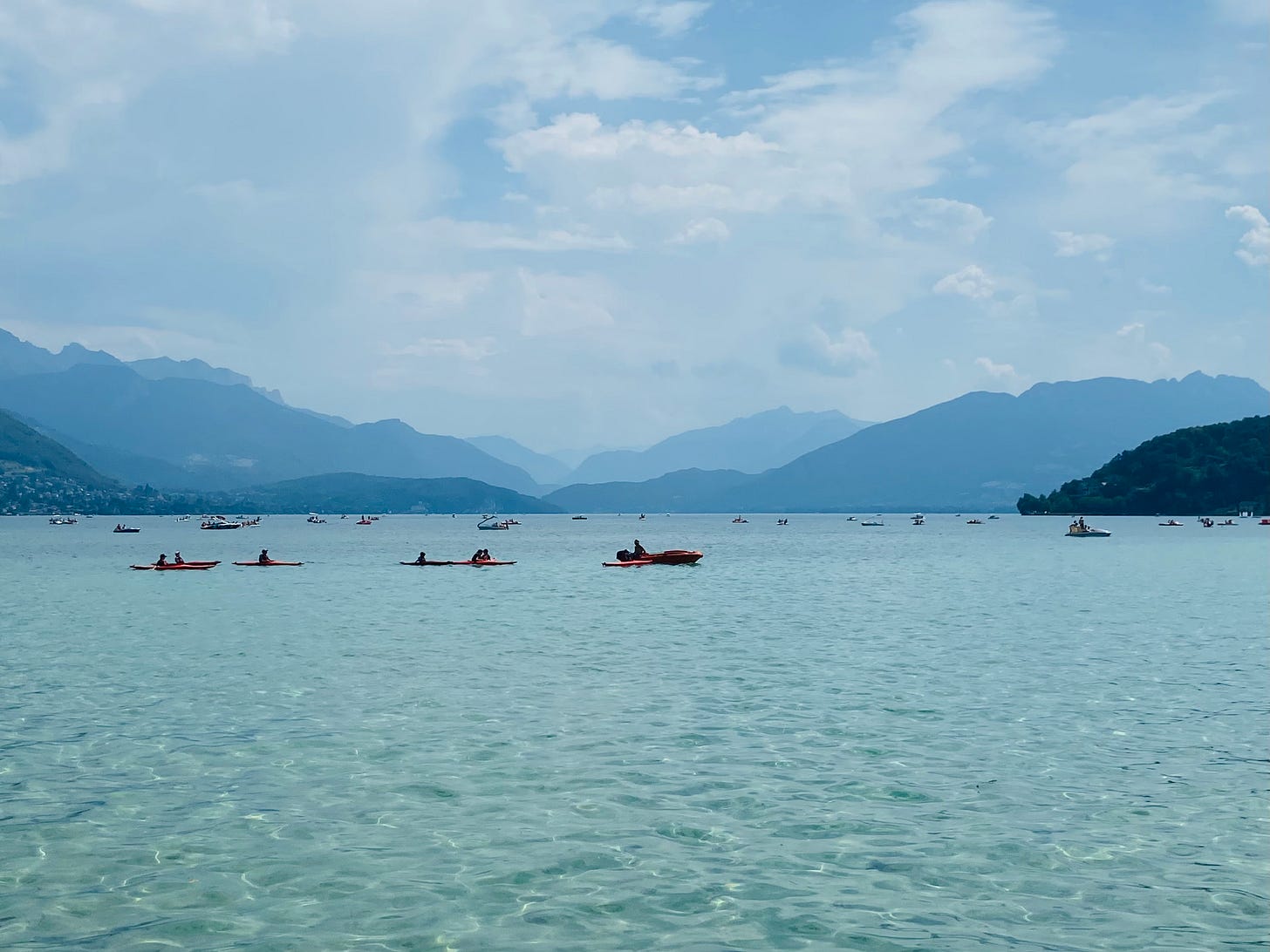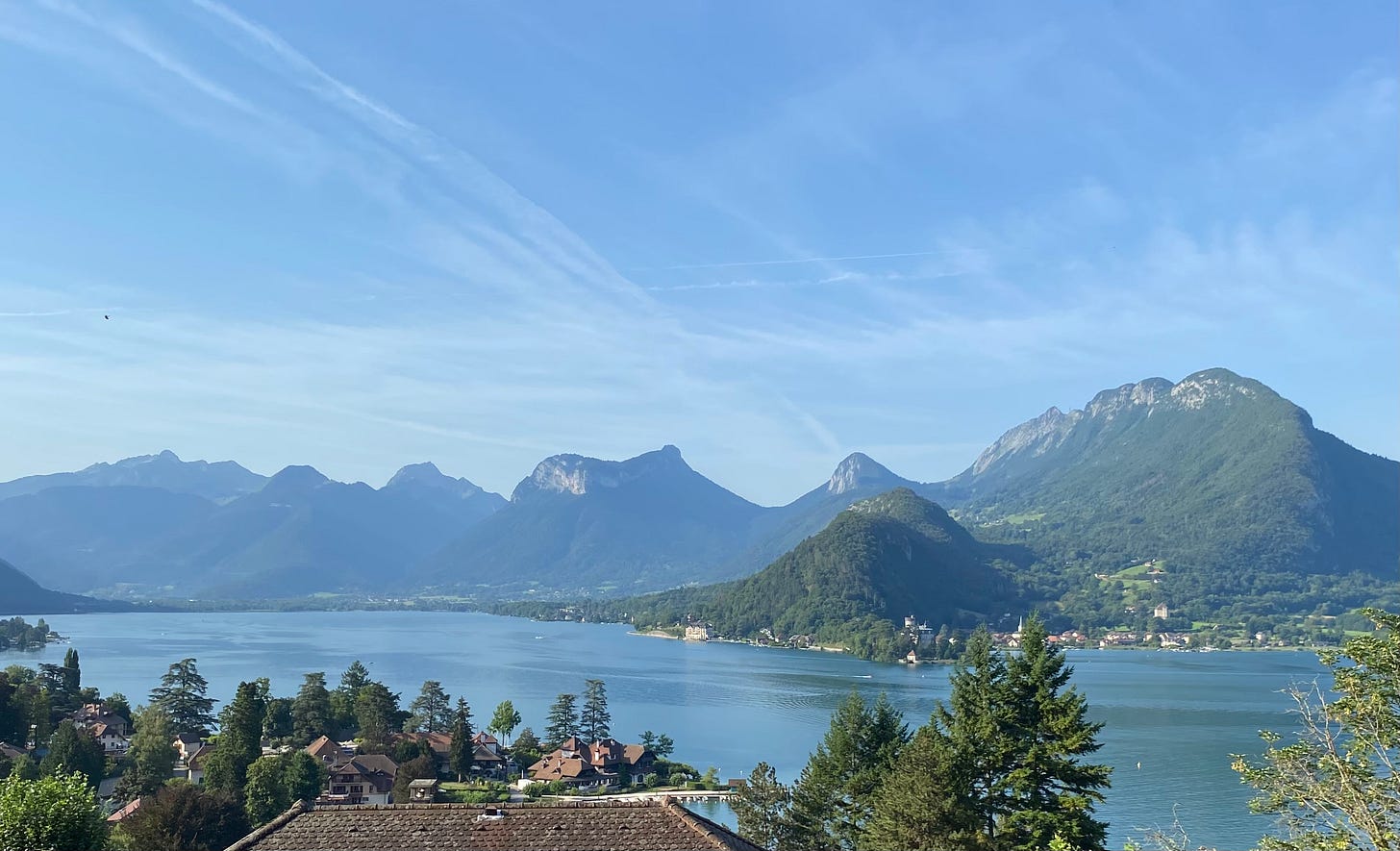A couple of weeks ago, my husband and I took a quick jaunt to “the Venice of the Alps,” Annecy, France. The charming medieval town sits at one end of a brilliant blue lake surrounded by mountains.
Annecy is only a two-hour drive from our front door. Why did we wait so long to visit?

I brought back more from our trip than memories—most of it good! Read on for some thoughts on travel, a few life lessons, and a recipe.
Wisdom from Crowds
“Nobody goes there anymore. It’s too crowded” is a cute joke but terrible advice. Seasoned travelers, jet-setters, and travel writers just love to steer us normies away from popular destinations. This advice has a cake-eating, jaded vibe—as though places like Paris, Venice, Barcelona, and London have nothing left to offer us or are irretrievably spoiled by the presence of other tourists. Sure enough, my search for “things to do in Annecy” turned up warnings not to go in the summer, when the town would be infested with tourists.
But these places are popular for a reason, and we don’t have to deny ourselves wonderful experiences just because other people are there too. With a couple of quick shifts, we will enjoy even the most touristy of hot spots. First, we can shift the place and time we see the sights. Our family lived in Prague for four years, and I was always struck by how, a mere block from the throngs in Old Town Square, the streets were peaceful and deserted. Those empty side streets offer beauty and history too. In Annecy, the old city was, as predicted, jam-packed, and so one morning my husband and I headed out of town along the Thiou River. We greeted runners and older people doing yard work, we petted all the dogs, and we enjoyed the unconventional beauties of daily life in a small French city.
We can also shift the time we’re out and about. We can take a siesta (or, if you’re me, catch up on social media) during the busy afternoon rush, and emerge refreshed in the cool of the evening. Morning larks and night owls have a special advantage; in the early morning and late nights we have the streets to ourselves. I once had an early call for a singing job in Prague, and I relished strolling right through a totally empty Old Town Square on my way.
Second, we can shift our mindset; if we can’t beat the crowds, we can join them. Travel writers and online grumblers will try to persuade us otherwise, but other tourists are not intransigent obstructions out to spoil our fun. They are human beings, the same as we are, and they have the same enthusiasms and desires as we do. It helps to keep this truth in mind when we’re in long lines or jockeying to get the perfect photo.
And speaking of other people and their hopes and dreams, we can take a lesson from the yield signs on French roads, which say “Vous n’avez pas la priorité.” This literally translates as “You don’t have priority,” or, as my husband puts it, “Hold your horses. You are not that important.” “Vous n’avez pas la priorité” comprises a whole moral code in one line. The rest is commentary.
What looks like rudeness might in fact be reasonable. One night, we arrived about fifteen minutes early for our dinner reservation. The server told us the restaurant wasn’t open yet, and we would have to come back later. Couldn’t we just sit at one of the outside tables? we wondered. But nope. We thought this was pretty strange, but all was forgiven when we arrived at the proper time and were graciously conducted to our table. Two nights later, the same thing happened at another restaurant.1 Again the server barred the way, again we were a bit taken aback, but again when we returned we were greeted with a smile and quickly seated. I sensed a trend.
Upon reflection, I realized that the workers were right not to permit customers to sit down before the restaurant opened. As I have written before, American hustle culture expects people to work for free—to answer emails on the weekend, to come in early and stay late, to catch up on paperwork during vacations, and to fulfill the customer’s every desire, no matter how onerous or time-consuming. French culture, by contrast, believes in paying people for their work—all their work. If the restaurant opens at 7pm, it is not fair to ask servers to get started at 6:45. And even though it might seem excessive to forbid our waiting at outside tables, the workers likely want to avoid the unpleasant task of policing the tables and shooing squatters away. Better to take a walk around the block to whet our appetites—and to stop being so dang early all the time.
Epiphanies from a Crash
Pain and trauma are not the same as injury. So, as I mentioned above, most of the things I brought back from our trip were good, but the other thing wasn’t.2 Our hotel had e-bikes, so on our first day we took a ride around Lake Annecy. My downfall (literally) was my caffeine addiction. We stopped at a lakeside café so I could get an espresso, and as I was dismounting, I tripped over my bike.3 E-bikes are extremely heavy, and I was not prepared for the extra weight. Down I tumbled with the bike on top, and my rib bore the brunt; my fall was broken by my rib smashing into the bar of the bike rack. Yes, the refrain from this song was going through my head:
I will spare you a photo, but trust me, it looked (and, two weeks later, still looks!) grisly. Instead, please enjoy this photo from earlier in our ride:
The internet informed me that there is nothing doctors can do for a broken rib, but because I was finding such useful activities as coughing, laughing, and breathing to be extremely unpleasant, I couldn’t help recalling that doctors can give you painkillers. So off to the ER I went, and after a consultation followed by x-rays, I emerged with some really good drugs and a diagnosis: Nothing broken, but trauma to the intercostal muscles.
And that’s when I had my epiphany—that pain and trauma need not ruin our lives. Even though my rib hurt (and still does), it’s nothing worse than that. Pain doesn’t have to imply irreversible damage or cause us to live in fear. It’s a temporary affliction that is an inevitable part of being human. We don’t go through this world unscathed—or if we do, we are missing out on a lot of adventures. With some help and sympathy, we are capable of enduring pain and trauma and coming through changed but healed. And, yes, this applies to emotional pain too.
That being said, movies are pretend. Obviously we all know this intellectually, but fights in movies inculcate the subliminal message that getting hurt doesn’t, well, hurt. Think back to literally any movie fight you have ever seen in your entire life. The heroes are always indestructible, impervious to bullets, encased in invisible armor, infinitely fast and clever. My rib snafu says thumbs-down on this lie. I don’t care how badass the hero is, or how much adrenaline is coursing through his system. If he takes a vicious kick to the ribs, he will not bounce right back and rejoin the fray. He will take a minute to sit and whimper, the same as I did.4
Think about it: Most of us have only limited personal experience with fights and injuries, but a lifetime of watching people emerge totally unharmed from brutal treatment that would kill us mere mortals. That is some powerful indoctrination. I think these movie fights instill an unconscious view that suffering people are whiners. Sometimes reality has to jab us in the ribs to remind us to be compassionate instead of impatient with those who are suffering.
Stereotypes are true—but only the nice ones. As I discovered in the ER, it is a slander to claim that the French are supercilious and hate Americans. Everyone in the hospital was kind to me, in spite of my execrable French. It wasn’t just the workers either. I dropped my glasses in the waiting room, and a woman, seeing the look of doom on my face at the prospect of having to bend over, darted across the room and handed them to me with an understanding smile. On the other hand, in my experience it really is true that French food is outstanding.
The same goes for us Americans. It is unjust and inaccurate to claim that we are all crass, loud, and entitled, but it really is true that we Americans are exceptionally friendly. I could go on: Swiss people really are extraordinarily organized and efficient. Brits really do have a dry, wry wit. Czechoslovakia and Minnesota really have produced outstanding hockey players as well as inspiring political leaders with radiant smiles.


I have a theory to explain why only the nice stereotypes are true. Bad experiences make a stronger impression on us than good ones. So if we encounter, say, one rude French person, that experience will overwhelm the many other positive ones. And then we extrapolate from a single negative experience to a whole group. Sadly, it’s the opposite with positive experiences, which we tend to ignore or brush aside as just normal. It can take repeated pleasant exposures before it sinks in that, for example, all those nice older folks who greeted us on our river walk might actually be typical French people.
“What shall it profit a man if he shall gain the whole world, but lose his own soul?” The total cost for my trip to the ER, the x-rays, the consultation with the doctor, and the good drugs? 99 euros (or about $108). That was the expensive tourist price; people living in France pay only 18 euros for a visit to the ER.5 We were also delighted to discover that all the busses in the area were free during July and August. Life is good when essential services are non-profit.
We often talk about issues like universal healthcare and public transportation in moral terms—and I agree that it is immoral that healthcare is so expensive in the US and that working people need to depend on private cars in order to have a job—but funding these public goods is practical too. Had I been unable to get emergency care, we would have gone straight home, instead of sticking around and spending money in Annecy. The free busses allow vacationers to easily visit beaches, castles, and nearby towns, generating income for local businesses and good will from the tourists, who may, like us, decide to return one day soon. Everybody wins!
How about you, readers? What life lessons have you learned from your travels? What nice stereotypes have you found to be true, or negative ones to be untrue? Please share your thoughts in the comments!
The Tidbit
One night in Annecy, I had a salad that was so fantastic that I decided to create my own version. This recipe serves four as an elegant appetizer. You can make it a couple of hours ahead and stick it in the fridge until dinner—or just leave it on the countertop while you prepare the rest of the meal. The salad is delicious either chilled or at room temperature.
Fancy Annecy Waldorf Salad
Ingredients
For the croutons:
4 slices of crusty bread
1 garlic clove, halved
about 4T olive oil
about 1/2c grated Parmesan
For the salad:
2 stalks of celery
1 small or half of a large fennel bulb with fronds
1 Granny Smith apple
a 250gm (8oz) ball of fresh whole-milk mozzarella, cut into four thick slices (you might have some left over for sandwiches the next day)
12 toasted walnut halves, coarsely chopped
For the dressing:
2tsp each fig jam and balsamic vinegar
4T olive oil
salt and pepper
Method
Make the croutons: Heat the oven to 200C/400F. Rub both sides of each slice of bread with the garlic halves and place the bread on a baking sheet lined with parchment paper. Drizzle the olive oil over each slice and then top with a bit of Parmesan. Bake for about 10 minutes, until the cheese has browned slightly. Flip the croutons over and sprinkle on some more Parmesan. Bake another 5 minutes or so. Cool the croutons on a rack. Note: You can do this step earlier in the day and leave the croutons on the rack until you’re ready for them.
Prepare the vegetables: While the croutons are baking, finely mince the celery. Core the fennel bulb, reserving the fronds for later, and mince finely. Peel and core the apple and mince finely. (All the pieces should be at most 1cm across.) Dump all the veggies in a bowl and mix.
Prepare the dressing: In a ramekin, mix the jam and vinegar. Have the olive oil ready on the side.
Assemble the salads: Lay each mozzarella slice in a large, flat bowl. Evenly scatter the chopped vegetables over each slice, followed by the walnut pieces, followed by the fennel fronds. Drizzle the jam-vinegar mixture over each salad, followed by the olive oil. Finish with salt and a generous grind of black pepper. Lay a crouton alongside the salad in each bowl. Bon appétit!
Walking around a city all day is hungry work! We were eager for our dinners!
This is a reference to a time when my kids were little. They were playing in the basement playroom, and I heard a tremendous crash. I called down from the kitchen, “Is everything ok down there?” and my son replied, “Most of the things are ok, but the other thing isn’t.”
I am the clumsiest person ever. It is a wonder I have made it this long.
And for the record, I am no wimp. My daughter was almost born in our car because we left for the hospital so late; I didn’t realize that the mild discomfort I had been experiencing for several hours was in fact labor pains. Another time, when I had appendicitis, I tried to leave the hospital because I didn’t think the pain was all that bad. Luckily for me, my husband insisted I stay put.
Unless they’re children or seniors, in which case they pay eight euros, or if they are victims of terrorism or domestic violence or are there to donate an organ all their medical treatment is free. Yes, I had a lot of time to read the posters in the waiting room.








